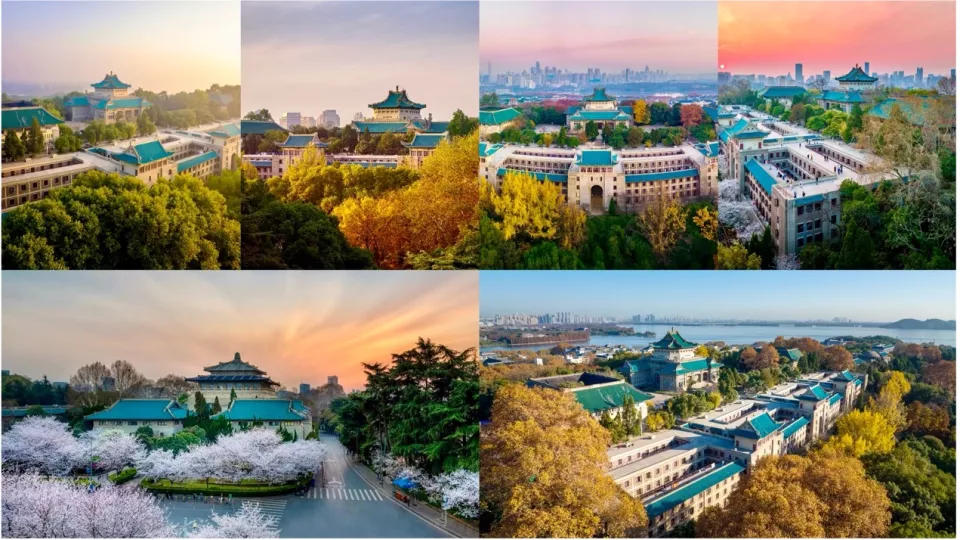The visit, involving week-long events from 18th – 22nd March 2024, centered around the “Sino-Swedish Colloquium on Global Sustainability Governance”. It was hosted at Wuhan University, and was coupled with the side event “Perspectives from Swedish Researchers & Businesses on Corporate Sustainability” held at the Embassy of Sweden in Beijing.
“Our aim was to explore academic collaboration and exchanges on global sustainability governance between Swedish and Chinese academia. But of course, you don’t travel this far without taking in a huge amount of impressions. Wuhan University with its palatial architecture, Beijing itself and both the cultural differences and our shared engagement for climate neutrality. Swedish companies and investors in China also contributed with significant insights into the rapid Chinese development,” says Andreas Inghammar, Deputy Dean at LUSEM.
The events at Wuhan University, were co-organized by Lund University’s Department of Business Law and Wuhan University’s Research Institute of Environmental Law. The Swedish delegation was welcomed by senior officials including the Vice President of Wuhan University, the Chief Legal Advisor of the Ministry of Ecology and Environment of China, and the Vice President of the Chinese Society of Environment and Resources Law. Senior officials from the Embassy of Sweden in China, such as the Counsellor for Science and Innovation Tina Sundström Karlberg, also participated in the events in Wuhan, accompanying the delegation.
Three thematic sessions of the colloquium covered cutting-edge topics standing at the nexus of global sustainability governance namely: “Governance Pathways towards Climate Neutrality,” “Greening Economic Transition and Trade Flows,” and “ESG as a New Governance Tool to Achieve Corporate Sustainability”. The colloquium fostered vibrant dialogues and communications between Swedish and Chinese scholars, policymakers, and practitioners on policy, regulations and strategies towards sustainable development and climate neutrality.
Sweden’s Ambassador for Sustainable Business from the Ministry of Foreign Affairs of Sweden, Cecilia Ekholm, delivered a keynote, sharing Sweden’s innovative sustainability strategies and reinforcing the critical role of business and industrial sectors in addressing global climate challenges and achieving sustainable development.
Moreover, the Colloquium also celebrated the launch of the book “Carbon Emissions Trading in China: Law, Policy, and Mechanisms” published by Edward Elgar recently. This book, co-authored by Prof. Tianbao Qin of Wuhan University and Dr. Meng Zhang of LUSEM, stands as a significant academic output from the ongoing collaboration on green transition policy between the two institutions.
A side event was hosted by the Embassy of Sweden in Beijing, titled “Perspectives from Swedish Researchers & Businesses on Corporate Sustainability”. It provided a platform for Swedish business leaders and scholars to discuss the implications of emerging EU and China’s policies and regulations on sustainable corporate practices in Sweden and China. This dialogue was catalyzed by contributions from the Swedish Trade and Invest Council (Business Sweden), the Swedish Environmental Research Institute (IVL), and major Swedish corporations operating in China (IKEA, Volvo Group, Tetra Pak, SEB, LKAB, SKF, Lindex, Munters, Sandvik), deepening the inter-sectoral cooperation on responsible business conduct and sustainable supply chains.
Per Augustsson, the Ambassador of Sweden to China, praised the outcomes of the Delegation, emphasizing partnerships towards sustainability governance between academic circles and industry leaders in Sweden and China.
“Facing the urgent call for global sustainability governance towards climate neutrality, all stakeholders should work hand in hand. Climate change in particular, offers a pivotal opportunity for a rejuvenated momentum of global cooperation at the same time as it poses crucial collective challenges,” says Dr. Meng Zhang, the initiator of the Sino-Swedish project.
As he looks to the future, Dr. Meng Zhang adds that this delegation’s visit not only positions Lund University and Swedish academia at the forefront of global efforts towards achieving the climate neutrality target and the 2030 Sustainable Development Goals, but also showcases how academic institutions can play a pivotal role in bridging the polarized and divided world through constructive dialogue, collaborative initiatives, and shared goals.
“It gives hope and drives the agenda forward,” says Dr. Meng Zhang in conclusion.

